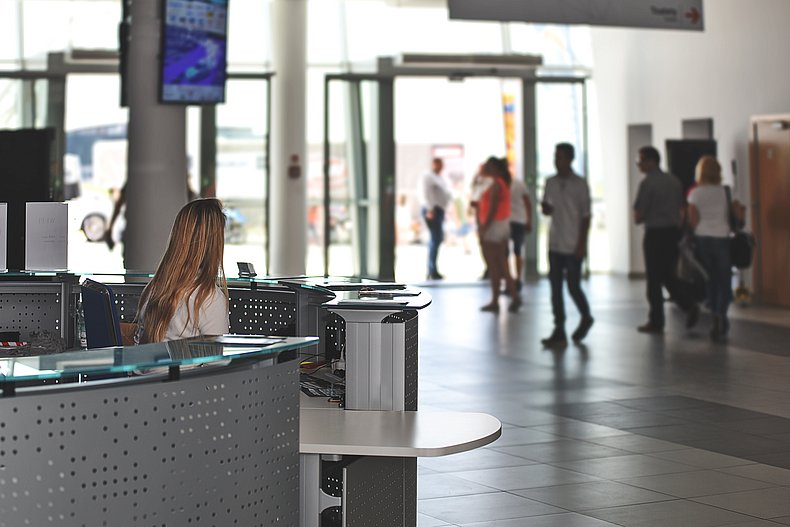The organization of a semester or study abroad requires a lot of time, nerves and planning. Having arrived in your destination country, you still have the biggest task ahead of you: settling in to a foreign country with a foreign culture, language and people. The start at a new university also often involves complications and difficulties, especially when the university system is very different from the one in your home country. In order to overcome these obstacles stress-free, the correct counselling centers can be a great help. In this blog post, we would like to introduce you to some of the most important contact points at German universities, so that you know who you can turn to for questions, or who can help you orientate yourself and make contacts.
Counselling Centers at German Universities
Whom can you contact in case of starting difficulties or problems?
Overview
International Office: university office for the organization of academic affairs abroad
ESN: volunteer association to support international students
Studierendenwerk: information and advice on student everyday life
AStA: elected representation of student interests in higher education policy
Fachschaft: volunteer committee of the respective study programs/faculties
Tutorien: help and application examples for individual courses
Prüfungssekretariat: responsible for examinations and certificates of performance
Psychological counselling: free contact point for psychological problems
International Office / Akademisches Auslandsamt
The International Office which is also called Akademisches Auslandsamt or Referat Internationales at some universities is responsible for all German students who go abroad (outgoing students) and for foreign students like you who come to Germany to study (incoming students). It is the central point of contact for any problems that may arise concerning your enrolment at the university, your courses and timetable, the transfer of your grades to your home university and everything else that directly affects your study experience in Germany. At some universities, especially if there is no local Erasmus Student Network (see below), the International Office also organizes meetings and excursions where you can get to know other (mainly international) students, but also the regional culture and the Country.
Erasmus Student Network (ESN)

The ESN exists in all countries participating in the Erasmus exchange program. However, the offer is not limited to Erasmus students, but open to all (international) students. Unfortunately, local ESN associations do not exist in all German university towns. You can find information on the website of the German Association on whether your place of study is included. If this is the case, you will find volunteer German students here as direct contact persons who are happy to help you with everyday and university problems. The ESN also organizes parties and excursions to interesting places, sometimes also cross-section events, where you can meet international students from other cities - definitely a good place to make first contacts and find friends.
Studierendenwerk / Studentenwerk
There is a national German Studierendenwerk (student union). At this institution, you can inform yourself about everything you need to know about studying in Germany before you enter the country, and usually get free advice and help. In addition, there are smaller student unions that are responsible for the individual local universities. As a rule, they look after the halls of residence or help you find accommodation. In some cities, you can also get an inexpensive initial equipment for your flat there. In addition, the Studentenwerke are responsible for providing food in the refectories and offer counselling services ranging from social and psychological to legal advice.
AStA / Studentenrat

The AStA (“Allgemeiner Studierendenausschuss” meaning General Student Committee), which is often known as the Studentenrat (Student Council) in East Germany, exists at almost every German university. It represents the interests of the students and is usually elected by the student parliament, thus being a kind of legislative representation of the students. In addition to this political importance, the AStA also offers legal and social counselling and provides you with job and housing offers in your city of study. In addition, it usually offers inexpensive copying and printing services. If you are entitled to a semester ticket*, the AStA is also responsible for this. The exact area of responsibility and the offer may vary from university to university, but you should be able to understand this easily by checking their website.
*Semester ticket: A semester ticket is a ticket for public transport that you as a student receive in many regions of Germany. It is limited to a certain area or the federal state in which you are studying. On the AStA website you can find out exactly where you can use the ticket, for which only a one-time fee is due. If you absolve a complete study program in Germany, this is usually already included in the semester fee and you will receive the ticket by post or e-mail. The regulations for a semester abroad are very variable. However, if you have the opportunity to receive a semester ticket, it is usually worth it. An example: If you are planning to study at a public university in North Rhine-Westphalia, you can use your semester ticket to travel by all public local transport (bus, S-Bahn, U-Bahn, regional train, regional express) in the state of North Rhine-Westphalia without having to pay for the individual journeys.
Fachschaft of Your Study Course
Each faculty, or often also individual or smaller groups of study courses, has its own Fachschaft (student representatives), which takes care of the direct interests of the students of the respective subject and consists of voluntary students. No matter whether you have problems with lecturers, simple questions of understanding or subject-specific difficulties - your fellow students who are Fachschaft-members will help you wherever possible. In most cases, the Fachschaft has its own office, which you can visit during its opening hours to discuss your problems personally. The work of the Fachschaft hereby concentrates on the concrete content as well as the structure of the different subjects. Additionally, the members usually organize meetings, events or parties where you can get to know your fellow students better.
Tutorium / Tutorial

It depends on your subject of study and your courses whether a Tutorium is a possibility for you to clarify expert questions. If a tutorial is offered for one of your courses, it is usually advisable to make use of this offer. There you can deepen the knowledge you have gained from the respective course or apply and process the mostly theoretical contents of the lectures in practice. A Tutorium is mainly offered in economics, mathematics and technical subjects at German universities. Use the opportunity to clarify questions of understanding and to understand the new material with the help of the tutors. Tutors - the people who hold a tutorial - are usually fellow students from higher semesters who received a particularly good grade in a certain course and can therefore help others who have difficulties with the content. However, tutorials often also help to understand what a possible final exam might look like and what the instructors attach particular importance to when correcting.
Prüfungssekretariat
Everything that directly relates to your examinations, the examination registrations and cancellations as well the recognition of your achievements is administered by the Prüfungssekretariat (Examination Secretariat) of your German university. If you have any questions regarding your exams or missed the deadline for registration, you can ask for help there. It's not easy to fully understand the German university system directly - so it's not too bad if you missed a deadline or can't fully understand the crediting of certain achievements. Most employees of the examination offices understand the difficult situation of foreign students, although you should not overtax their kindness. Furthermore, the examination secretariat is responsible for applying for provisional certificates of achievement (e.g. for applications) or for the registration and admission of the thesis.
Psychological Counselling

If you are emotionally overburdened or stressed, have severe exam anxiety or other psychological problems, there is a counselling center at almost every German university where you can seek psychological advice. Studying can sometimes be exhausting or even oppressive - especially when you’re far away from home. In such situations it is important that you get help in time and don't let yourself be held back by false shame. The counselling centers are usually free of charge. The counsellors are bound to secrecy, so they are not allowed to pass on what you tell to others - not even to the university, government agencies or other authorities. They can also help you assess whether a longer-term psychotherapeutic treatment would be appropriate for you and recommend individually suitable doctors. However, treatment costs money, but unlike most other health insurances for foreign students, the <link en products health-insurance>VELA Optimal and Basis Tariff also cover psychotherapeutic treatment. With one of these tariffs, you don't have to worry about a possible financial risk.
So you see, there are numerous institutions at German universities that offer help. Take advantage of them, that's what the different centres are there for. If you have any concerns about the language, we can hopefully reassure you: Most advice centers also offer their services in English and even if they don't, almost all staff and students at German universities know at least a little English.



